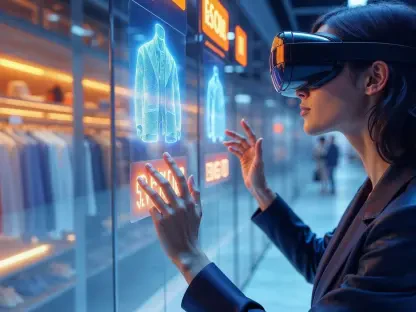The retail landscape is undergoing significant transformations with the convergence of artificial intelligence (AI) and e-commerce. These technological advancements are redefining consumer behaviors and expectations, marking a new era in retail. From personalized shopping experiences to innovative in-store technologies, the future of retail is being shaped by these dynamic forces that promise to revolutionize the way consumers shop and interact with brands.
The Rise of E-Commerce Giants
Over the past decade, e-commerce giants like Amazon, eBay, and Alibaba have revolutionized the way people shop. The convenience of browsing thousands of products from home, coupled with swift shipping options, has led to a surge in online shopping. E-commerce platforms have leveraged advanced algorithms to offer personalized recommendations, making the shopping experience more intuitive and engaging.The exponential growth of mobile commerce has enabled consumers to shop from anywhere at any time. Smartphones and tablets have become integral shopping tools, contributing significantly to rising online sales. The ability to compare prices, read reviews, and make purchases on-the-go has heightened consumer expectations for fast, convenient, and seamless shopping experiences, challenging traditional retail paradigms.Furthermore, the impact of e-commerce on global sales has been staggering. In 2020 alone, online sales reached $4.28 trillion, showcasing the dominance of companies like Amazon in the retail space. These e-commerce titans have thrived by offering an extensive product selection, efficient delivery services, and individualized shopping experiences through sophisticated algorithms. Consumers have come to expect more from their online shopping experiences, and those expectations continue to rise. As a result, traditional brick-and-mortar stores are striving to emulate some of the strengths of e-commerce to remain competitive. The relentless advancement in mobile technologies and the increasing reliance on internet accessibility will only continue to drive the growth of e-commerce in the foreseeable future.
The Role of AI in Personalizing Shopping Experiences
AI technologies have been pivotal in transforming how consumers interact with retail platforms. Advanced algorithms analyze vast amounts of customer data to deliver highly personalized shopping experiences. AI-driven recommendation engines suggest products based on past purchases, browsing history, and even social media interactions, making each shopping journey unique and tailored to individual preferences. This level of personalization not only enhances customer satisfaction but also fosters brand loyalty, as consumers are more likely to return to a retailer that consistently meets their needs and expectations.In addition to personalization, AI assistants such as chatbots and virtual shoppers provide real-time customer support, guiding users through product searches, answering queries, and even processing transactions. Voice-activated devices like Amazon Echo and Google Home further enhance the shopping experience by allowing users to make purchases through simple voice commands, adding an element of hands-free convenience. These AI-powered tools make the shopping journey smoother and more enjoyable, removing friction points that might otherwise deter consumers.The integration of AI in retail operations extends beyond customer-facing applications. Behind the scenes, AI helps optimize inventory management, forecast demand, and even streamline supply chain processes. By leveraging the power of AI, retailers can operate more efficiently, reduce costs, and allocate resources more effectively, ultimately leading to improved customer experiences and increased profitability.
Innovations in Physical Retail Spaces
While online shopping continues to grow, brick-and-mortar stores are not becoming obsolete. Instead, they are evolving by incorporating cutting-edge technologies to attract and retain customers. Augmented reality (AR) and virtual reality (VR) are being used to create immersive shopping experiences. For instance, AR applications allow customers to try on clothes or visualize furniture in their homes without physically being in the store. These technologies give shoppers the opportunity to engage with products in a new and exciting way, bridging the gap between online and in-store experiences.The Internet of Things (IoT) and Radio Frequency Identification (RFID) are also enhancing in-store operations. IoT devices can streamline inventory management by providing real-time stock updates, while RFID technology ensures efficient product tracking. These innovations help retailers maintain optimal inventory levels and improve supply chain efficiency, leading to better customer satisfaction.Moreover, experiential retail is gaining traction, where physical stores offer unique customer experiences rather than just products. These stores may feature interactive displays, live demonstrations, and personalized services, enticing customers to visit and engage with the brand in new ways. By integrating digital technologies with traditional retail, companies can create cohesive shopping ecosystems that cater to modern consumer expectations.
The Emergence of Hybrid Retail Models
A significant trend in the future of retail is the blending of online and offline shopping experiences. Hybrid models are emerging, offering the convenience of e-commerce with the tactile experience of brick-and-mortar stores. Concepts like “click-and-collect” allow customers to order online and pick up their purchases in-store, providing a seamless fusion of both shopping modalities. This approach caters to consumers who appreciate the immediacy and physical interaction of in-store shopping but also desire the convenience and range of options available online.These hybrid models represent the future of retail, combining the strengths of both worlds to create more comprehensive and engaging shopping experiences. Experiential retail is also reimagining physical spaces, turning stores into destinations where customers can not only shop but also enjoy a variety of experiences. These stores are designed to offer unique interactions, such as interactive displays, live product demonstrations, and personalized services, encouraging customers to spend more time in-store and engage with the brand on a deeper level. By adopting a hybrid approach, retailers can better meet the diverse needs of contemporary consumers, ensuring they remain relevant and competitive in an increasingly digital marketplace.
AI in Inventory and Supply Chain Management
AI is also transforming behind-the-scenes operations in the retail sector, particularly in inventory and supply chain management. Predictive analytics driven by AI can forecast demand trends with high accuracy, allowing retailers to optimize their inventory accordingly. This reduces instances of stockouts and overstock situations, leading to more efficient operations and cost savings. Effective inventory management ensures that retailers can meet consumer demand without incurring unnecessary costs, contributing to overall business sustainability and profitability.Additionally, AI-driven supply chain management systems enhance logistics by optimizing routing and delivery schedules. These systems consider various factors such as weather conditions, traffic patterns, and delivery time windows to ensure timely and efficient deliveries. By leveraging AI, retailers can achieve higher operational efficiency and meet consumer demands more effectively.The integration of AI in supply chain management not only improves the speed and reliability of deliveries but also reduces the environmental impact by minimizing unnecessary transportation and optimizing resource use. As AI technologies continue to advance, their role in improving the efficiency and sustainability of retail operations will become increasingly vital.
Challenges and Opportunities Ahead
The retail industry is currently experiencing profound shifts as a result of the integration of artificial intelligence (AI) with e-commerce. These advancements in technology are significantly altering consumer behaviors and expectations, heralding a new chapter in the retail sector. The incorporation of AI enables personalized shopping experiences through recommendation systems and targeted advertisements, making shopping more tailored and engaging for consumers. Meanwhile, innovative in-store technologies, such as smart mirrors and automated checkouts, are enhancing the physical retail experience.Retailers are now equipped with data analytics tools to better understand customer preferences and optimize inventory management. This combination of online and in-store innovations is reshaping how consumers shop and how brands engage with them. The evolution driven by AI and e-commerce is poised to transform traditional retail models, making the shopping journey more seamless, personalized, and efficient. As these technologies continue to evolve, they promise to further revolutionize the retail landscape, setting new standards for consumer interaction and satisfaction.









